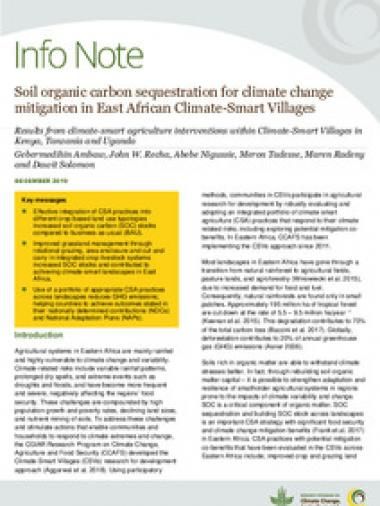Soil organic carbon sequestration for climate change mitigation in East African Climate-Smart Villages: Results from climate-smart agriculture interventions within Climate-Smart Villages in Kenya, Tanzania and Uganda

Agricultural systems in Eastern Africa are mainly rainfed and highly vulnerable to climate change and variability. Climate-related risks include variable rainfall patterns, prolonged dry spells, and extreme events such as droughts and floods, and have become more frequent and severe, negatively affecting the regions’ food security. These challenges are compounded by high population growth and poverty rates, declining land sizes, and nutrient mining of soils. To address these challenges and stimulate actions that enable communities and households to respond to climate extremes and change, the CGIAR Research Program on Climate Change, Agriculture and Food Security (CCAFS) developed the Climate-Smart Villages (CSVs) research for development approach (Aggarwal et al. 2018). Using participatory methods, communities in CSVs participate in agricultural research for development by robustly evaluating and adopting an integrated portfolio of climate-smart agriculture (CSA) practices that respond to their climate related risks, including exploring potential mitigation cobenefits. In Eastern Africa, CCAFS has been implementing the CSVs approach since 2011.
Citación
Ambaw G, Recha J, Nigussie A, Tadesse M, Radeny M, Solomon D. 2019. Soil organic carbon sequestration for climate change mitigation in East African Climate-Smart Villages: Results from climate-smart agriculture interventions within Climate-Smart Villages in Kenya, Tanzania and Uganda. CCAFS Info Note. Wageningen, Netherlands: CGIAR Research Program on Climate Change, Agriculture and Food Security (CCAFS).